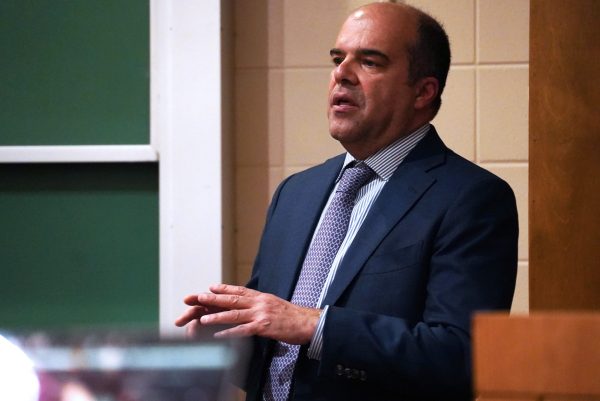Driehaus professor claims lack of transparency regarding only Black department chair’s removal
Photo courtesy of DePaul University
The Driehaus College of Business, located on DePaul’s Loop Campus.
Professors are claiming a lack of transparency after the university skirted protocols to remove the Driehaus College of Business’ only Black department chair.
Elijah Brewer, former chair of finance, told The DePaulia that stakeholders — consisting of the Finance Advisory Board, tenured and tenured-track faculty of the finance and real estate departments, and staff members of the two units — were not made aware of the appointment of Thomas Berry as chair until the official announcement was made June 25 to Driehaus and July 17 via Newsline.
“We never had that discussion,” Brewer said. “It was announced, and the public announcement message consisted of an extremely long letter to justify the decision without actually having a conversation with the important stakeholders of each unit.”
The decision to combine the finance and real estate departments was made in the spring. Thomas Donley, the interim dean of Driehaus, was in charge of appointing the chair of the newly formed department.
Throughout the 2019-2020 academic year, the Business School leadership provided several hints to suggest that they were inclined to move in another direction for someone to assume the role of chair of the new combined department, according to Brewer.
“I sensed that they wanted another person to be head of the new unit,” Brewer said. “I was told that there were three strikes against me that would make it difficult for my appointment as head of the new unit to get senior administration approval. Nevertheless, I submitted my application for consideration to lead this combined unit with the support of many of my colleagues and Finance Advisory Board members.”
Professor Valerie Johnson, a friend and colleague of Brewer’s, said she thought the process was not transparent, and that in her experience in the College of Liberal Arts and Sciences, her department would conduct a vote, the vote would be counted and that vote would be disclosed.
“Afterward, the result of the vote is transmitted to the dean, who then, and only then, solicits confidential comments about the person that the department selected,” Johnson said. “When I was chair of my department, I received the actual results from the confidential survey, although the comments were anonymous. That’s transparency.”
“In the past, tenured and tenure-track faculty would vote and provide input into the appointment of the person to lead the department,” Brewer added. “With few, if any exceptions, the will of the department and its stakeholders tend to be supported by the college leadership. What makes this case different?”
In Brewer’s case, there wasn’t a vote; the interim dean sent out an anonymous survey instead. The results were never disclosed.
Brewer said that in normal circumstances, that vote would have been revealed.
“They would have come to the stakeholders and said, ‘Thank you for your input on this important decision on who will be the head of the finance and real estate department. Our decision is based on the following,’” Brewer added. “That never happened. I think such an important decision as the chair of finance and real estate should have been, at a minimum, discussed with the tenured and tenure-track faculty members of both units prior to the public announcement.”
University spokesperson Carol Hughes said that the anonymous survey aligned with other procedures, such as a department-wide vote.
Hughes said that the candidates advanced their chair nominations via an anonymous survey. Then, the finance and real estate faculty and staff were asked to provide feedback that would remain confidential via a second survey.
Hughes added that this process was consistent with university procedures for gathering stakeholder feedback.
“The business college followed college and university procedures for merging academic units and selecting a chair for the combined department, and the process and outcome were discussed transparently with stakeholders,” Hughes said.
Johnson said that the anonymous survey results didn’t allow for complete transparency.
“Anonymous and confidential feedback is not a vote, and is certainly subject to the whims of those viewing the anonymous and confidential feedback,” she said.
Hughes responded on behalf of Donley, who was in charge of appointing the new chair and declined to comment to The DePaulia.
Donley interviewed three chair candidates, including Berry and Brewer. Donley chose the chair based on the results of the surveys, according to Hughes.
“This was a personnel decision and it would not be appropriate to discuss additional details,” Hughes said. “An announcement of the appointment was widely shared via email with faculty, staff, students and advisory board members of the college.”
The stakeholders received the survey, but did not find out the results of the chair appointment before the Driehaus-wide announcement was made.
“I know they didn’t have that conversation with the Finance Advisory Board,” Brewer said. “Otherwise, they would not have been surprised when I told them that they have decided to move in another direction on the leadership for the newly formed finance and real estate department.”
A member of the Finance Advisory Board, who requested anonymity, confirmed to The DePaulia that they did not find out the result before the university-wide announcement was made.
They said Brewer gave them notice, but no discussion about the decision occurred between the interim dean and the stakeholders.
Brewer was also the only Black department chair in the entire Driehaus College of Business until he was removed from his position.
“I do not understand how two officers of the university, Salma Ghanem and Tom Donley, could on one hand commit to ‘make DePaul a more just and equitable university that lives out its mission in deed, as well as word,’ yet submit to a process of selecting a chair that displaces the only African-American chair in the college of business,” Johnson said.
“Where is the concern or commitment to racial equity that was expressed in the ‘Message of Solidarity from DePaul University Officers’?” Johnson added. “I am equally baffled by a process of selecting a chair that does not regard transparency or accountability. Why wasn’t there an opportunity for faculty in the department to vote for its leadership, as would be consistent with shared governance?”
Brewer said his removal was in poor taste after DePaul reaffirmed its commitment to diversity and racial equality following national protests against racial injustice during the summer.
“I think it is insensitive in the environment in which we’re living in today to make a decision like that,” Brewer said.
Johnson said she believes the situation undermines faculty of color, calling for an explanation for university officers’ treatment of a Black faculty member as well-regarded as Brewer.
“How can one commit to upholding the dignity of all people on one hand, and treat its faculty of color in a manner that totally disregards dignity or respect?” she said. “As an African-American faculty who has taught at DePaul for 17 years, I have rarely felt valued or respected. If you interview other African-American faculty, I’m sure you will hear the same story.”
“Our tone and dispositions are constantly policed, and the university definitely doesn’t respond well to faculty of color who are vocal about racial equity,” Johnson added.
Donley declined to comment to DePaulia, citing that Berry’s appointment was, “a specific personnel decision, and as such we are unable to provide further details,” according to Hughes.
This situation is another instance of repeated behavior towards faculty of color at DePaul that results in them being pushed out, Johnson said.
“The list is long of faculty of color who have either been pushed out, who had to sue, or who have simply left,” she said. “What has happened to Dr. Brewer is par for the course.”

















Greg Price • Nov 24, 2020 at 8:28 pm
This incident is not a good look for Depaul University. As an institution in a city and metro area with a large Black population, that it does not “look like” the geography it is located in is shameful enough. To maltreat an accomplished Black scholar and academician like Dr. Brewer is absolutely shameful, and vulgar, and it suggests “racism.”
Depaul can and should do better. This sends a powerful signal, however imprecise, that Depaul is not willing or able to live up to the highest ideals of ” racial inclusion” that complement our nation’s democratic ideals.
–Greg Price